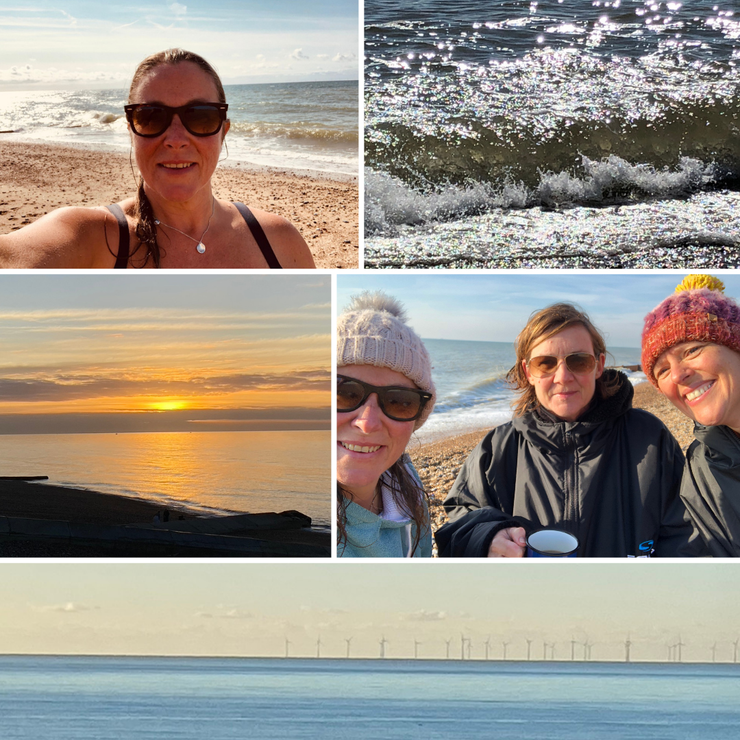And if I have been feeling stressed or anxious in my everyday life, I can feel that stress ebbing away as I enter the water. Once my head is immersed and I emerge “reborn”, the stress has disappeared completely, allowing me to refocus and face whatever is ahead.
Connections between cold water swimming and mental health
Studies have shown that cold water immersion can increase our levels of dopamine, serotonin and endorphins – neurotransmitters that influence mood, motivation and how we experience pleasure, and are really important to our overall sense of well-being. This is because the body responds to cold water by up-regulating these feel-good neurotransmitters as a way to compensate. Other studies have also shown that cold water swimming activates a number of responses (for example, increased blood flow to our core organs and our brain, which has a detoxicating effect, and increased electrical impulses from our nerve endings to our brain), which can be beneficial for those experiencing stress, anxiety and depression.
There is more scientific research to be done into the mental health and other health benefits of cold water swimming, and this is still in its relatively early stages.
Although only anecdotal, my own experiences of cold water swimming chime with some of these findings, particularly with regards to reduced anxiety and an increased sense of well-being post-swim. In fact, I often experience a “post-swim high”, where my mood is significantly elevated and I become super-productive and positive for the rest of the day. Nothing beats that feeling!
Sea swimming is rather addictive – albeit in a positive way. It’s made me feel even more connected with the city I live in (I’ve lived in Brighton & Hove for 20-odd years), and I find that, if I’m not swimming in the sea, I want to look at it, photograph it or paint it. The sea permeates and feeds my imagination.
Mental and physical rewards
But it isn’t just immersion in the water that is grounding, mindful and elicits responses that are beneficial for my well-being. For me, it’s also the act of swimming itself. I swim year-round – in a half wet-suit from November to March for anything between eight to 20 minutes, depending on the air and sea temperatures – and as the sea gets warmer, I swim for longer in my costume, including distance swims of between one and two kilometres.
The act of moving my body in long purposeful strokes is really mindful and it’s a great distraction from any day-to-day worries. Meanwhile, keeping an eye on my direction, my proximity to shore and the endless horizon helps to keep my mind occupied in a really productive and positive way.
There’s no other physical activity I’ve found as mood-enhancing and mentally and physically rewarding as sea swimming. It makes you feel alive like nothing else – and ready to face anything! And the sea swimming communities of Brighton, Shoreham and Worthing are really vibrant and welcoming.
A word about safety
Although it’s important to be mindful of who is boss in this scenario, and it’s most definitely the sea and mother nature. Cold water sea swimming isn’t a pursuit to be embarked on lightly, as there are risks and hazards associated with it. It’s important to make sound judgements about whether the conditions are safe enough and to get your body used to the cold water gradually.
For those of us who live on the coast, we are extremely lucky to have sea swimming so readily accessible to us. And if you feel that it could enhance your well-being while doing something physical in nature, then I would thoroughly recommend it. As many in the swimming community say, “you never regret a swim!”
If you would like to investigate sea swimming, there are a number of informal sea swimming community organisations in Worthing, Lancing, Shoreham and Brighton and Hove, which are a good starting point for meet-ups with others and for safety and technical information. You could try:
Mental Health Swims (Lancing, Shoreham and Hove)
Bluetits Chill Swimmers Worthing
Worfolk (Worthing)
Worthing, Lancing and Shoreham Sea Swimmers
Seabirds/Salty Seabirds (Brighton & Hove)
Fancy watching a short film about the joys of sea swimming? Our videographer, Kristian, produced an award-winning documentary, called 'Just Add Water', about the sea swimming communities of Adur and Worthing and what people love about getting in the sea all year round. Check out Kristian’s film on YouTube
